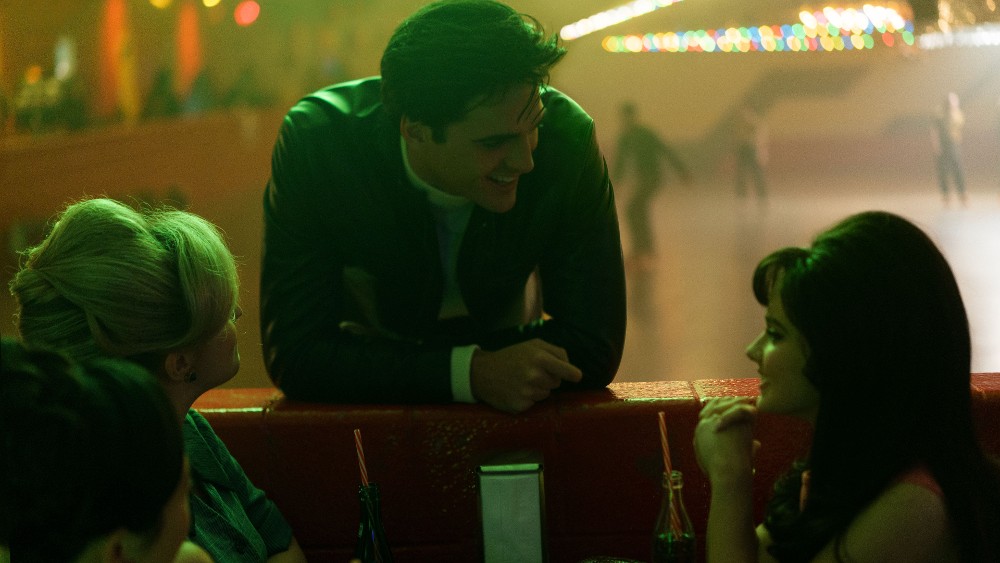
Filmmaker Sofia Coppola has always been quite renowned for the musical soundtracks for her films, working with Air on her debut feature, The Virgin Suicides, followed by having Kevin Shields of My Bloody Valentine scoring her 2003 film Lost in Translation, for which she won an Oscar for the screenplay. For 2006’s Marie Antoinette, she avoided the usual classical musical tropes that tend to go along with costume dramas in favor of a sound that included The Cure, Bow Wow Wow, and The Strokes.
For her Priscilla Presley biopic, Priscilla, Coppola not only brought on her husband, Thomas Mars, and his band Phoenix – who have scored and done music supervision for previous movies – but also called upon legendary Music Supervisor Randall Poster to collaborate with them on picking just the right songs. While some might expect the movie to be wall-to-wall Elvis Presley songs, it’s another case where a Coppola soundtrack diverges from the expected.
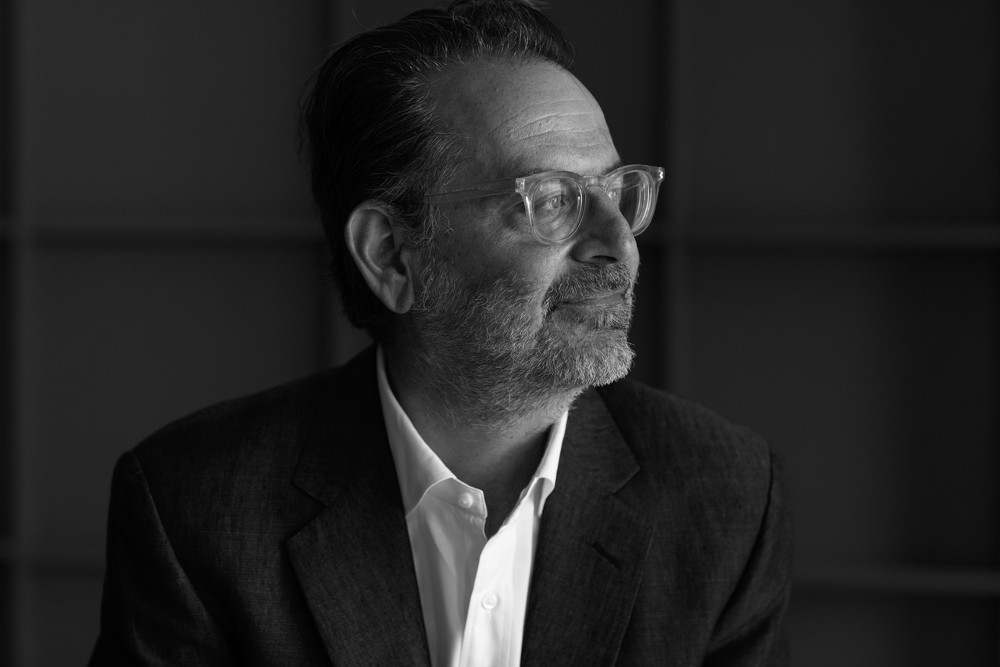
Below the Line got on Zoom with Poster to talk about the unique collaboration he had with Coppola, Mars and Phoenix for the Priscilla soundtrack. We also touched upon May December by Todd Haynes, one of Poster’s most frequent collaborators, and his work on Martin Scorsese‘s Killers of the Flower Moon.
Below the Line: You’ve been quite busy since we last spoke, which was for one of Wes’ movies, probably for The French Dispatch a few years ago.
Randall Poster: People ask me about specific songs in movies, and I can’t even remember anything. The movies all kind of blur. Did you get a chance to see Rick Linklater‘s new movie?
BTL: Hit Man at TIFF. It was amazing, I loved it.
Poster: That was my 200th movie.
BTL: Wow. Congratulations. That’s great.
Poster: Thank you.
BTL: I’m so used to seeing your name in credits, but Priscilla is an interesting case, since it says “Music by Phoenix and Randall Poster,” which I’ve never seen joined together like that. I also assumed you’ve worked with Sofia her whole career, but that wasn’t the case.
Poster: I haven’t. I mean, I’ve known Sofia for some time, primarily, through her brother Roman. We worked together on some commercial stuff over the years, but this was the first movie that I got involved with, where I was with her through the whole process. Phoenix, the unique crediting is that Thomas, Sofia’s husband and the lead singer of Phoenix, they were meant to do an original score, and the way it sort of turned out was that all of us worked closely together, and we kind of curated a score.
When it came down to it, it was like, “Well, what do we say we did?” I said, “I’ll share my credit with you guys, as long as there’s an ampersand.” They agreed to that, and I said, “Of course, I’m now in the band.” They actually invited me… I was on stage when they played at Madison Square Garden; they dressed me up like the Phantom of the Opera.
BTL: How did Sofia reach out to you about this? Thomas had done music for her other movies, and even was credited as music supervisor on a few of them.
Poster: I think a lot of it because the terms of all the period pieces and navigating the Elvis of it all, but it was a very much a collective. We were all here in New York. Sofia is the visionary, and I think in terms of the music as far as like the anachronistic music that’s in the film, I think that collectively we had the courage to say, “Let’s just defy period.” Sofia had it in her mind from the beginning to kick off the movie with the Ramones, and we then just took it from there. There’s a lot of music in the movie. There’s about 51 cues in the movie.
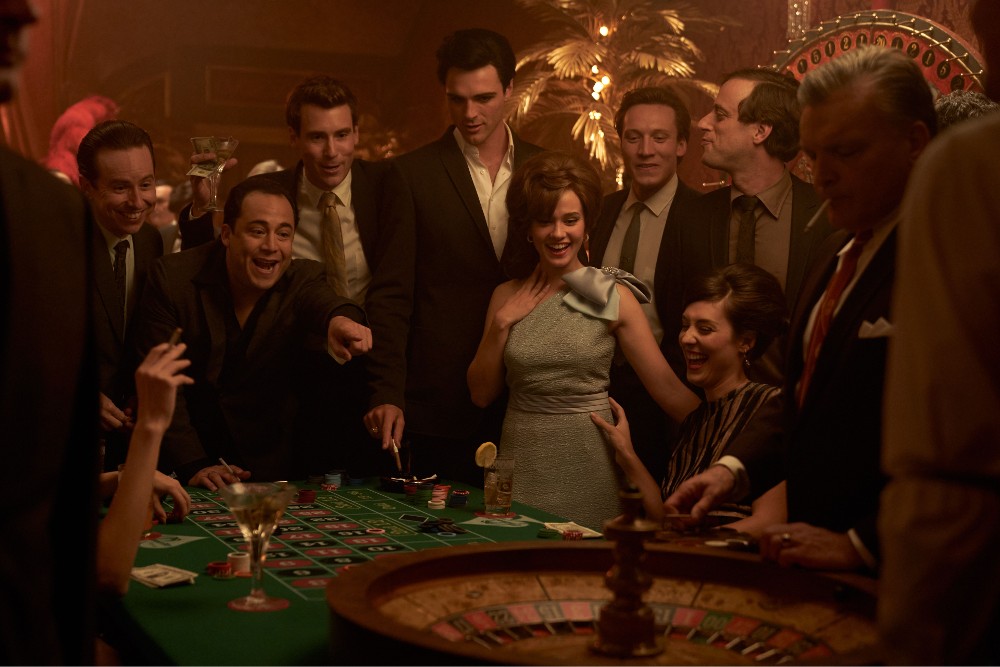
BTL: Sofia is renowned for her soundtracks. Virgin Suicides and Lost in Translation and Marie Antoinette, they all had these amazing soundtracks.
Poster: I’ve always admired her music vocabulary in her films; they’re very unique. They just had her stamp on them. Her instincts are so strong, and her vision is relentless, I would say.
BTL: Where was this project at when you come on board? Did she just have a finished screenplay? Had she shot anything yet?
Poster: Screenplay, because we did have to prepare some things for our on-camera, Jacob’s piano playing and singing and again, to prepare some of the other on-camera moments.
BTL: Are you starting out by just sitting in a room with Sofia and Thomas and talking about the music, or does Thomas already have some musical ideas?
Poster: Everybody had a lot of ideas, and I would say that my immediate focus at the outset was very focused on songs, and Thomas was very focused on score. In the process of, if you’re going to preview a movie, or you’re going to really get a sense of what the movie needs, you put temporary pieces in, especially in scoring, ’cause you haven’t scored the film. We just sort of came to the conclusion that we weren’t going to score the film.
BTL: So there’s no actual Phoenix incidental score at all?
Poster: No, that’s right. That’s why we’re music supervising together. They introduced us to these incredible musicians, Loral and Ronnel Raphael, who play music as Sons of Raphael, and the Phoenix fellows directed them in a couple of situations about making some original music, which they did, and then at the end of the movie, the Sons of Raphael play Phoenix’s “My Elixir.” That plays after Dolly Parton.
BTL: The Ramones song was from the record Phil Spector produced, right?
Poster: There’s a whole Phil Spector thing happening in the movie. There’s the Ramones, there’s the Ronettes, there’s the Righteous Brothers. So a bit of the Wall of Sound surrounding Elvis and Priscilla.
BTL: And from the very beginning, there were never going to be any Elvis needle drops or any Elvis music, necessarily?
Poster: We played around a little bit, but it’s Priscilla’s movie, really, and I think that we also had a lot of fun in terms of when Elvis had to surrender the reigning pop star mantle when he went into the Army and in came the likes of Frankie Valli and Fabian, so we kind of played with that, too. Where we have “Venus” being the running motif in the film, and “Crimson and Clover” has a great moment in the movie. That’s kind of the pop opera that hangs on to or propels the movie.
BTL: How familiar were Sofia and Thomas with the music of the ’50s and ’60s? I know they’re younger than me, and I’m not super-familiar with it.
Poster: I think they’re very knowledgeable. They’re music nerds like me, although I’m older.
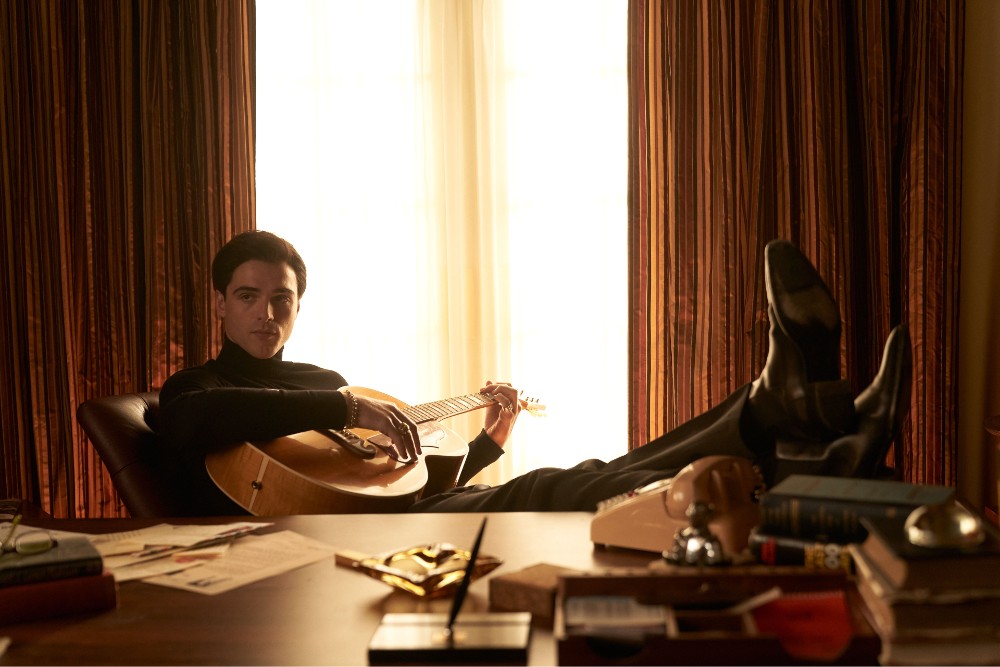
BTL: You talked a bit about Jacob playing the piano in Priscilla, so do you end up going to Canada while they’re shooting and work with him there?
Poster: We worked beforehand, and then we coached him, and if you’ve seen the movie, it’s minimal music, Elvis’ performance, it’s minimal. He sings at the first party. He sits at the piano and plays a little bit of “Whole Lotta Shakin’ Goin’ On,” and then we have an excerpt of the ’68 Comeback Special, where you basically are seeing him as people are watching him on television.
BTL: What else differentiates Priscilla from other projects you’ve done? I imagine every project you do is different in its own way.
Poster: I was very intrigued by the story. Sofia has such a unique way of looking at things. Even though we have 51 pieces of music, she really did a wonderful job protecting some of the silences in the movie. I think it really is a very timely story. The acting is just sensational.
Cailee, she really is the movie. She made a joke at the New York Film Festival, that they shot out of sequence, where she would be pregnant when they were shooting in the morning, and then she’d be 15 years old in the afternoon. And then Jacob, I think, does such a unique take on Elvis. I’ve never seen an actor who has that same sort of beauty that Elvis had from Jacob.
BTL: I’m always interested in how different directors approach music. I’ve talked to you before about Wes, and we spoke a little about Marty Scorsese. I want to ask about Todd Haynes. Did you end up not working on his most recent movie, May December?
Poster: I didn’t work on May December, but I introduced Todd to Marcelo Zarvas.
BTL: Nice. I spoke to Marcelo about it, and I know a little bit about Todd wanting to use music from a certain movie, and blending it together in an interesting way.
Poster: I have deep relationships with these directors, and so Todd called me when he was struggling with the fact he had ordained that the music in this film was from the other film, Michael LeGrand‘s The Go-Between. You can’t ignore a director’s instinct, and I would say the really fine directors that I work with, they all trust their instincts. Most of the time, it leads to something else, or it really is meant to be. Sometimes, the good ones, if they made a mistake, they adjust the rudder, and they get over it.
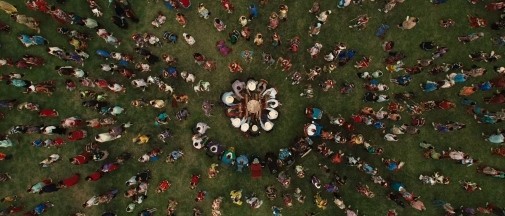
BTL: Last time we spoke, I asked about Killers of the Flower Moon. The late Robbie Robertson‘s score is gorgeous, and it’s so sad that he wasn’t able to hear how many people are loving it. Were you involved with things like the final scene with the Osage dancing around the drum? Were you there for things like that?
Poster: They had to go back. We shot the film two years ago, and I was in Oklahoma two times for 10 days, a trip for the on-camera work, and then we shot some the final sequence in New York, but then they went to actually shoot the Osage when they were having their convocation. I didn’t go, really Robbie, I think it’s a great thing that his last work is such a complete score.
Working with Scorsese, oftentimes, the song component or the licensed music component, or the on-camera band music dominates the musical component in the movie, where [in Killers], it’s really quite complete start to finish. There are a lot of songs in the movie, too, but I guess when a movie is three and a half hours, there’s a lot of everything.
BTL: Do you go to set for a lot of these movies, or is a lot of what you do, something you can do from your office?
Poster: I go on set when there’s music on camera. For instance, in Killers of the Flower Moon, I was there when we had to have the string band that plays at the wedding in 1919. And then, I went back, and we did the jazz band in 1926 playing in the town party. And then, at the end of the movie with the radio orchestra, we shot that in New York, and I’m on set. Otherwise, I visit set to just because that’s where the director is, and I need a question answered. With Priscilla, I never was on set in Toronto, but I worked with Jacob in L.A when he was rehearsing and then, it was great. Everybody was here in New York.
BTL: Has the way you worked changed a lot with COVID where you approach things differently today? Are you still travelling as much?
Poster: No, it’s probably not as much, maybe, but it definitely renewed my enthusiasm for hanging out in editing rooms with other people. Or going to a mixing stage and being with the people that you’re making the movies with. I went up to Toronto when we were mixing Priscilla.
Priscilla is now playing in select theaters and will expand nationwide on Friday, Nov. 3. The official soundtrack record should also be available that same day.





